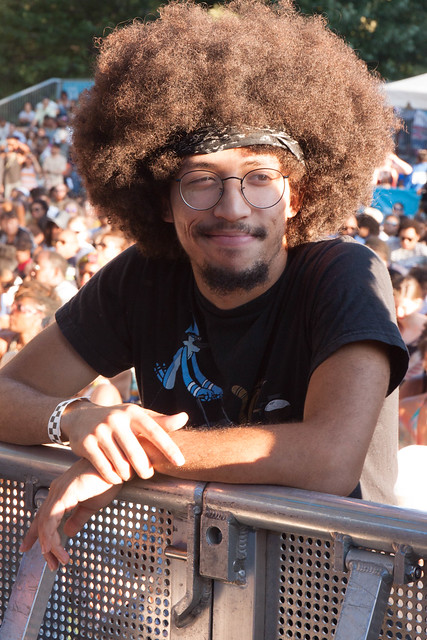Comprised of Massama Dogo (lead vocals, guitar), Clayton Englar (sax), Megan Nortrup (sax), Scott Aronson (bass), Franck Martins (lead guitar). and Aaron Gibian (percussion and drums), the Washington, DC-based sextet Elikeh has developed a reputation for material that sonically has been classified as Afropop, as it draws influence from Western Africa — frequently meshing traditional Togolese rhythms with rock, funk, jazz with lyrics that deal with global themes and personal journeys.
Dogo, the band’s leader was born in Togo and while in the African nation, he played and sang in several local bands, including a local band also named Elikeh, with whom he released one album, Nyade in 2007. Several years later, Dogo relocated to Washington, DC met the current lineup and then wrote, recorded and released their 2010 Stateside debut, Adje! Adje! The sextet’s 2012 release Between 2 Worlds featured renowned Malian guitarist Vieux Farka Toure and Further and Dark Star Orchestra‘s John Kadlecik received international attention in World Music circles.
As the story goes, the band was considering calling it quits, finishing out the songs they had booked and moving on to other creative endeavors. During a band meeting in which the members of the band were going to discuss their future and splitting up, the band’s guitarist Frank Martins kept playing the entire time. He came up with a musical idea, someone else would join in, another band member would join in and then everyone began jamming — until they developed a song. One of the sax players had recorded the jam session and while listening to that session, the members of the band realized that their break up talk was premature. “We’re all excited about the band now,” Dogo mentioned in press notes. “It’s lucky the guitarist didn’t want to put down his instrument. The EP saved us.”
That jam session inspired “The Conversation,” which appears on the Washington, DC-based sextet’s recently released Kondona, an EP that gets it title from ” a ceremony they hold every five years in the northern part of my country,” Dogo explains. “It’s an initiation, a way to welcome the young men into the adult part of the community. It seemed right for what had happened to us, although we still have a long way to go.”
The EP’s first single the aforementioned “The Conversation” manages to possess clear elements of Afrobeat and sounds partially influenced by
Fela Kuti (in particular
Afrodesiac/Open and Close and
Expensive Shit/He Miss Road-era Fela) and contemporary American Afrobeat bands, including fellow DC area band
The Funk Ark, NYC’s
Ikebe Shakedown and others,
as the song begins with an introductory section with soaring organ chords throughout before establishing the tight, percussive groove that holds the entire song together, and allows for each section and each instrumentalist to show off their immense chops — and conversing with each other throughout the length of the song. Of course, each region of the world specializes in subtle variations of the genre so that Togolese Afrobeat won’t be exactly the same as American Afrobeat or Nigerian Afrobeat — and in the case of Elikeh, the band’s sound possesses subtle elements of highlife, the genre that influenced Fela, thanks to its upbeat feel. But interestingly enough there’s subtle elements of pop and other African traditional sounds, which helps to set them apart from a very crowded DC Afrobeat scene. And yet somehow, from listening to this single it’s surprising to me that they’re not much larger than what they currently are; hopefully, the blogosphere can get it right.
Like this:
Like Loading...


